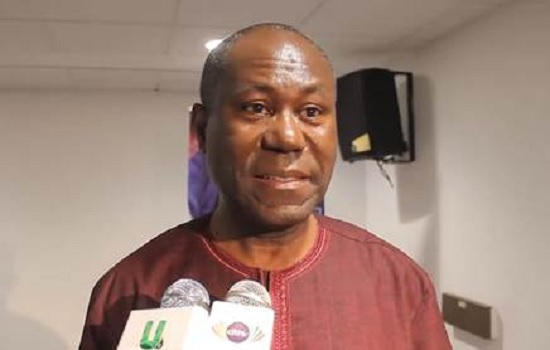
The Ghana Cocoa Board says it is working to make cocoa production profitable so the trees are not destroyed to make way for rubber plantations.
According to the board, irrigation facilities and artificial pollination practices are being introduced on farms across the country as part of efforts to boost productivity for the benefit of farmers.
“What we want to do to stem that problem is, we want to make cocoa farming attractive. By making sure that the yield per hectare is high. And that even if you cut cocoa and plant rubber, you lose,” Head of the Cocoa Health and Extension Division of COCOBOD Emmanuel A. Opoku said.
He was speaking at the Agric Dialogue Series organized by the Ghana Agricultural and Rural Development Journalists Association in collaboration with the Open Forum on Agricultural Biotechnology at the CSIR.
The dialogue was under the theme; Putting Ghana’s Cocoa Industry on a Firmer Footing; What should change? The dialogue brought together more than 50 journalists from the Eastern, Western, Central, Volta and Greater Accra regions to interact with stakeholders in the cocoa industry on what can be done to ensure sustainability of the cocoa industry.

Some aggrieved farmers who were affected
The problem of destruction of cocoa trees in the Eastern Region to make way for rubber plantations has become topical over the last few months.
A recent Joy News documentary on the issue, PLASTIC CHOCOLATE highlighted how cocoa communities in the region have been hit with food insecurity following the destruction of the cocoa trees.
Related: Cocoa communities hit with food insecurity after destruction of farms
Mr. Opoku says there is a long-term strategy to deal with the problem. “Nobody will plant rubber if they find out that what they are getting from cocoa is two to three times more than what they are getting from rubber.
"This is why we are cutting the diseased farms to re-plant, that is why we are bringing on board irrigation and artificial pollination,” he added.
President of the Concerned Farmers Association Nana Oboadie told the forum an immediate solution is needed beyond the long-term plan. “The beans that are bearing the fruits are being cut down. COCOBOD is not doing anything about the destruction. In Enchi in the Western Region, almost 15,000 acres of cocoa have been targeted. I have sent messages to the minister but nothing is being done. Where lies the future of the cocoa of this industry?” he quizzed.

“I don’t see the effort of COCOBOD. There is no future for cocoa in this country and at the end of the day, we have to even dissolve COCOBOD,” Nana Oboadie added.
Secretary of the Asikasu Odumase Cocoa Life Farmers Association Eric Nordzoh who himself has been a victim of the destruction of cocoa trees told the forum cocoa farmers are struggling to make a living as a result of government’s inability to help them protect their farms. “We are disappointed because farmers can’t even feed the families,” he said.
Dr Richard Ampadu-Ameyaw, a Socio-Economic and Policy Researcher at the Science and Technology Policy Research Institute (STEPRI) of the CSIR called for a reform of Ghana’s land tenure system to protect farmers.
“The land tenure system that we have here is a threat to our agriculture. And if we don’t address it, maybe we will have no agriculture in the future. If you work on my land and I decide I don’t need cocoa, you cannot do anything. And so for me, I believe the focus should be on the land tenure system,” he said.
President of the Ghana Agric and Rural Development Journalists Association (GARDJA) Richmond Frimpong warned failing government support for cocoa farmers could endanger the sustainability of the industry.
“COCOBOD ought to come out with a blueprint that will turn the situation around. I can confidently say that COCOBOD has neglected farmers. Those old people in farming are fading out. But the situation is not motivating the youth to venture into cocoa business?” he explained.
Mr Emmanuel Opoku announced COCOBOD will soon introduce an irrigation scheme for farmers that will help them deal with the possible impact of worsening weather on their farms.
He also indicated as parts of efforts to increase cocoa processing in the country, a deal will be signed with China soon to provide loans for the establishment of small-scale cocoa processing factors in the country.
Read Full Story





















Facebook
Twitter
Pinterest
Instagram
Google+
YouTube
LinkedIn
RSS